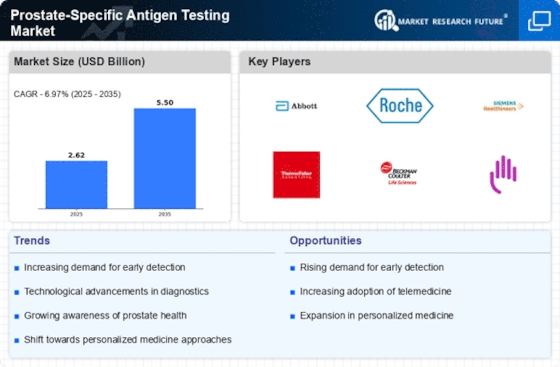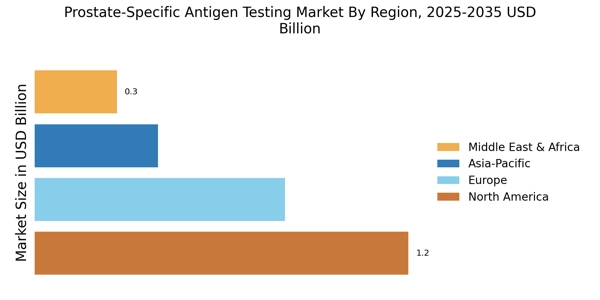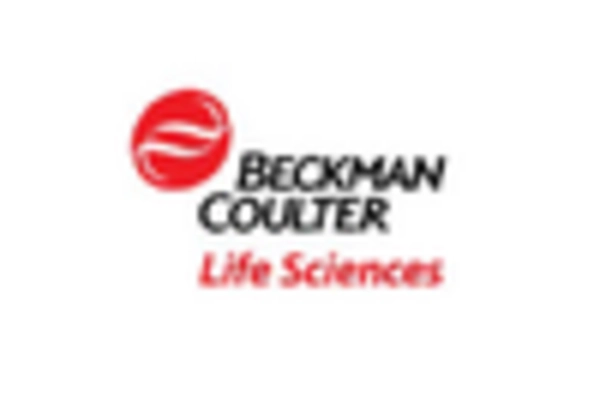Aging Male Population
The aging male population serves as a significant driver for the Prostate-Specific Antigen Testing Market. As men age, their risk of developing prostate cancer increases, leading to a heightened need for regular screening. Demographic data suggests that the global population of men aged 50 and above is on the rise, which correlates with an increased demand for prostate-specific antigen testing. This demographic shift is likely to influence healthcare policies and practices, encouraging more healthcare providers to recommend PSA testing as part of routine health check-ups for older men. The Prostate-Specific Antigen Testing Market is poised to benefit from this trend, as healthcare systems adapt to the needs of an aging population. Furthermore, the emphasis on preventive healthcare in older demographics may lead to more proactive approaches in cancer screening, thereby enhancing market growth.
Growing Awareness and Education
Growing awareness and education regarding prostate health are pivotal drivers for the Prostate-Specific Antigen Testing Market. Campaigns aimed at educating men about the risks of prostate cancer and the importance of early detection are becoming increasingly prevalent. This heightened awareness is likely to encourage more men to seek PSA testing, thereby boosting market demand. Healthcare organizations and advocacy groups are actively promoting prostate cancer awareness, which is essential in dispelling myths and misconceptions surrounding the disease. As more men become informed about the benefits of early screening, the Prostate-Specific Antigen Testing Market is expected to see a surge in testing rates. This trend underscores the importance of education in driving healthcare decisions and improving health outcomes for men at risk of prostate cancer.
Integration of Telehealth Services
The integration of telehealth services is emerging as a significant driver for the Prostate-Specific Antigen Testing Market. Telehealth platforms facilitate remote consultations and follow-ups, making it easier for patients to access PSA testing services. This trend is particularly beneficial for men who may face barriers to in-person healthcare, such as mobility issues or geographical constraints. The convenience of telehealth is likely to increase the number of men seeking prostate-specific antigen testing, thereby expanding the market. Furthermore, as healthcare systems continue to embrace digital solutions, the Prostate-Specific Antigen Testing Market is expected to adapt accordingly. The ability to provide remote testing options and consultations may enhance patient engagement and adherence to screening recommendations, ultimately contributing to improved health outcomes.
Rising Incidence of Prostate Cancer
The increasing incidence of prostate cancer is a primary driver for the Prostate-Specific Antigen Testing Market. Statistics indicate that prostate cancer is one of the most prevalent cancers among men, with millions diagnosed annually. This rising trend necessitates effective screening methods, thereby propelling the demand for prostate-specific antigen testing. As awareness about prostate cancer grows, more men are likely to seek testing, further driving market growth. The Prostate-Specific Antigen Testing Market is expected to expand as healthcare providers emphasize early detection and intervention strategies. This focus on early diagnosis is crucial, as it can significantly improve treatment outcomes and survival rates. Consequently, the rising incidence of prostate cancer is likely to sustain the demand for PSA testing, making it a pivotal factor in the market's expansion.
Advancements in Testing Technologies
Technological advancements in testing methods are transforming the Prostate-Specific Antigen Testing Market. Innovations such as high-sensitivity assays and point-of-care testing are enhancing the accuracy and convenience of PSA testing. These advancements not only improve diagnostic capabilities but also facilitate earlier detection of prostate cancer, which is crucial for effective treatment. Market data indicates that the introduction of novel testing technologies is likely to increase the adoption rates of PSA testing among healthcare providers. As these technologies become more accessible, the Prostate-Specific Antigen Testing Market is expected to experience significant growth. Additionally, the integration of artificial intelligence and machine learning in diagnostic processes may further refine testing accuracy, thereby attracting more patients and healthcare professionals to utilize PSA testing.

















